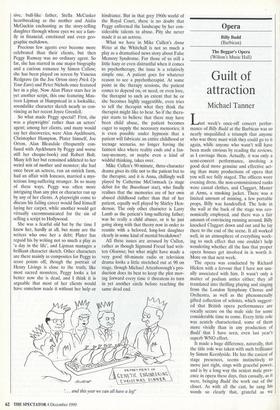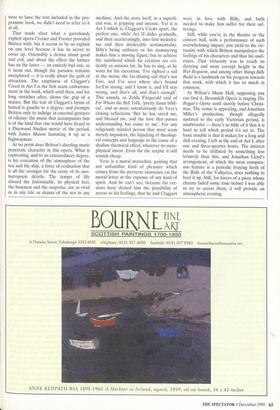Opera
Billy Budd (Barbican) The Beggar's Opera (Wilton's Music Hall)
Guilt of attraction
Michael Tanner
Last week's once-off concert perfor- mance of Billy Budd at the Barbican was so nearly unqualified a triumph that anyone who was there must wish they could go to it again, while anyone who wasn't will have been made envious by reading the reviews, as I envisage them. Actually, it was only a semi-concert performance, involving a good deal more genuine and effective act- ing than many productions of opera that you will see fully staged. The officers wore evening dress, the non-commissioned ranks wore casual clothes, and Claggart, Master at Arms, a smoking jacket. There was a limited amount of miming, a few portable props, Billy was handcuffed. The hole in the wall at the back of the stage was eco- nomically employed, and there was a fair amount of convincing running around. Billy knocked Claggart down and out and he lay there to the end of the scene. It all worked well, in an atmosphere of everything work- ing to such effect that one couldn't help wondering whether all the fuss that proper opera houses get involved in is worth it. More on that next week.
The opera was conducted by Richard Hickox with a fervour that I have not usu- ally associated with him. It wasn't only a matter of podium antics either; they all translated into thrilling playing and singing from the London Symphony Chorus and Orchestra, as well as the phenomenally gifted collection of soloists, which suggest- ed that British opera performances are vocally secure on the male side for some considerable time to come. Every little role was acutely characterised, some of them more vividly than in any production of Budd that I have seen, even last year's superb WNO effort.
It made a huge difference, naturally, that the title role was taken with such brilliance by Simon Keenlyside. He has the easiest of stage presences, seems instinctively to move just right, sings with graceful power, and is by a long way the sexiest male pres- ence in opera these days, thus casually, as it were, bringing Budd the work out of the closet. As with all the cast, he sang his words so clearly that, grateful as we were to have the text included in the pro- gramme book, we didn't need to refer to it at all.
That made clear what a garrulously explicit opera Crozier and Forster provided Britten with: but it seems to be so explicit on one level because it has its secret to cover up. Ostensibly a drama about good and evil, and about the effect the former has on the latter — an entirely bad one, as it turns out, though the paradox remains unexplored — it is really about the guilt of attraction. The emptiness of Claggart's Creed in Act I is the first acute embarrass- ment in the work, which until then, and for long stretches after, shows the grip of a master. But the text of Claggart's hymn of hatred is gauche to a degree, and prompts Britten only to indulge in external gestures of villainy: the music that accompanies him is of the kind that one would have heard in a Pinewood Studios movie of the period, with James Mason hamming it up as a highwayman.
At no point does Britten's dazzling music penetrate character in this opera. What is captivating, and to an extraordinary degree, is his evocation of the atmosphere of the sea and the ship, a force of realisation that is all the stronger for the rarity of its ono- matopoeic details. The tempo of life aboard the Indomitable, its physical feel, the busyness and the suspense, are as vivid as in any tale or drama of the sea in any
medium. And the story itself, in a superfi- cial way, is gripping and intense. Yet it is Act I which is, Claggart's Credo apart, the perfect one, while Act II slides gradually, and then acceleratingly, into first melodra- ma and then intolerable sentimentality. Billy's being ordinary or his stammering makes him a moving figure; but to achieve the sainthood which his creators are evi- dently so anxious for, he has to sing, as he waits for his execution, 'I've sighted a sail in the storm, the far-shining sail that's not Fate, and I've seen where she's bound for/I'm strong, and I know it, and I'll stay strong, and that's all, and that's enough'. This sounds, as Zelda Fitzgerald said of For Whom the Bell Tolls, 'pretty damn bibli- cal', and so more ostentatiously do Vere's closing reflections 'But he has saved me, and blessed me, and the love that passes understanding has come to me'. For any religiously minded person that must seem merely impudent, the hijacking of theologi- cal concepts and language in the cause of a shallow theatrical effect, whatever its meta- physical intent. Even for the sceptic it still sounds cheap.
Vere is a moral masochist, gaining that not unfamiliar kind of pleasure which comes from the perverse insistence on the moral letter at the expense of any kind of spirit. And he can't see, because his cre- ators have denied him the possibility of access to his feelings, that he and Claggart were in love with Billy, and both needed to make him suffer for their suf- ferings.
Still, while you're in the theatre or the concert hall, with a performance of such overwhelming impact, you yield to the vir- tuosity with which Britten manipulates the feelings of his characters and thus his audi- ences. That virtuosity was to reach its dizzying and most corrupt height in the War Requiem, and among other things Billy Budd is a landmark on his progress towards that work, with which it has so much in common.
At Wilton's Music Hall, supposing you can find it, Broomhill Opera is staging The Beggar's Opera until shortly before Christ- mas. The venue is appealing, and Jonathan Miller's production, though allegedly updated to the early Victorian period, is unobtrusive — there's so little of it that it is hard to tell which period it's set in. The basic trouble is that it makes for a long and dull evening. I left at the end of Act I, after one and three-quarter hours. The interest needs to be titillated by something less leisurely than this, and Jonathan Lloyd's arrangement, of which the most conspicu- ous feature is a periodic braying forth of the Ride of the Valkyries, does nothing to beef it up. Still, for lovers of a piece whose charms faded some time before I was able to try to access them, it will provide an atmospheric evening.



















































































 Previous page
Previous page